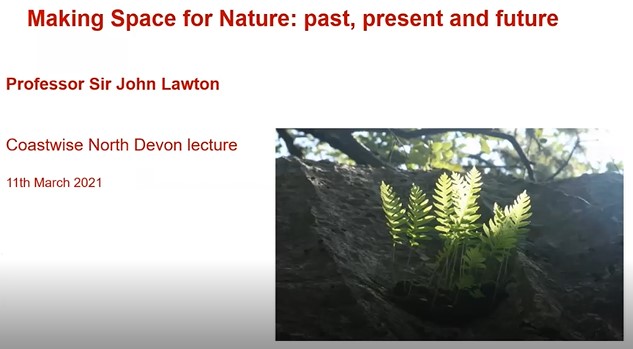
…….no, not pizzas, but the principles of the 2010 DEFRA report on the environment "Making Space for Nature", or the Lawton Report (so called) , by a panel chaired by Sir John Lawton.
Coastwise had the benefit of a talk by Sir John expounding these principles, and the background and current developments in the world of environmental improvement.
The realisation that nature needs support to survive in our industrialised world started in the 18th century, but was first taken seriously by Charles Rothschild, fabulously rich and a keen entomologist, realised that whole habitats need preserving, and gifted Wicken Fen and Woodwelton Fens to the National Trust.
Factors such as pollution, urbanisation, climate change and agricultural intensification have meant that although protected sites have increased in number, unchanged land for nature has decreased. As an example, the Culm grasslands here in Norht Devon have decreased from about 37% of the designated area in 1947 to less than 2% in 2007.
A major step forward was achieved when it was discovered that, with support, land can be restored to its original stae, and not just preserved. Leighton Moss in Lancashire was restored to its original state when the pumped drainage "improvement" capability to increase agicultural area ceased due to lack of funds.
The RSPB's Minsmere Reserve was created by flooding drained land, and it created Lakenheath Fen from carrot fields by flooding and some interventional management.
The Lawton Report made 24 recommendations covering a range of environment-related societal benefits, and probably led to a long-term change in government thinking, including Local Nature Recovery Strategies and Environmental Land Management Schemes.
The key to environmental improvement lies in understanding that the larger the area under consideration, the less management per unit area is required; scale is highly desirable.
Despite huge steps forward, including the well-publicised re-wilding projects such as the Knepp Estate in Sussex, there is a great deal to do in the field. For example, there is no central register of environmental improvement areas or schemes, so no easy way of measuring progress or judging what approaches are most effective, given local circumstances. In addition, pressure to increase agricultural self-sufficiency will maintain pressure for more intense agriculture.
Sir John was speaking to a highly supportive audience, who fully appreciated hearing a comprehensive summary of this crucial field from such an authoritative speaker.
A link to the YouTube video of the talk is here……

